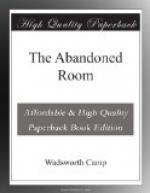In the upper hall they found Katherine waiting. Her endeavours were hard to face.
“You shan’t go there for me, Bobby,” she said.
“Isn’t it clear I must go in my own service?” he said, trying to smile.
He wouldn’t speak to her again. He wouldn’t look at her. Her anxiety and the affection in her eyes weakened him, and he needed all his strength, for at the entrance of the dark, narrow corridor the fear met him.
Rawlins brought a candle and guided him down the corridor. Graham came, too. The detective locked the door leading to the private hall and slipped the key in his pocket.
“Nobody will get through there any more than they will through the other door which I’ll watch.”
With Graham’s help he made a quick inspection of the room, searching the closets and glancing beneath the bed and behind the furniture.
“There’s no one,” he said, preparing to depart. “I tell you there’s no chance of a physical attack.”
His unimaginative mind cried out.
“I tell you you’ll find nothing, learn nothing, for there’s nothing here to find, nothing to learn.”
“Just the same,” Graham urged, “you’ll call out, won’t you, Bobby, at the first sign of anything out of the way? For God’s sake take no foolish chances.”
“I don’t want the light,” Bobby forced himself to say. “My grandfather and Howells both put their candles out. I want everything as it was when they were attacked.”
Rawlins nodded and, followed by Graham, carried the candle from the room and closed the broken door.
The sudden solitude and the darkness crushed Bobby, taking his breath. Yellow flames, the response of his eyes to the disappearance of the candle, tore across the blackness, confusing him. He felt his way to the wall near the open window. He sat down there, facing the bed.
At first he couldn’t see the bed. He saw only the projections of his fancy, stimulated by Silas Blackburn’s story, against the black screen of the night. He understood at last what the old man had meant. The darkness did appear to possess a physical resistance, and as the minutes lengthened it seemed to encase all the suffering the room had ever harboured. But he wouldn’t close his eyes as his grandfather had done. It was a defence to keep them on the spot where the bed stood while his mind, in spite of his will, pictured, lying there, still forms with bandaged heads. He wouldn’t close his eyes even when those fancied shapes commenced to struggle in grotesque and impotent motion, like ants whose hill has been demolished. Nor could he drive from his ears the echoes of delirium that seemed to have lingered in the old room. He continued to watch the darkness until the outlines of the room and of its furniture dimly detached themselves from the black pall. The snow apparently caught what feeble light the moon forced through, reflecting it with a disconsolate inefficiency. He could see




